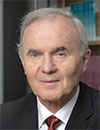Central banks and the macroeconomy
This event was held as part of a series of high-level webinars that will be livestreamed on our website to the general public as part of the 19th BIS Annual Conference.
The webinar "Central banks and the macroeconomy" was delivered by Professor Lucrezia Reichlin and followed by a discussion with Otmar Issing on Thursday 3 December.
Abstract
In her webinar, Ms Reichlin presented "Monetary-fiscal crosswinds in the European Monetary Union", a paper co-authored by Ms Reichlin, Juan Antolín-Díaz and Giovanni Ricco
We study the interaction between monetary and fiscal policy in the European Monetary Union (EMU). This is done by estimating an empirical model - incorporating a newly constructed fiscal data set for France, Germany, Italy and Spain since 1991 - informed by the linearised version of the general government intertemporal budget constraint in the monetary union. In the baseline case, the central bank targets average inflation, which acts as a constraint on each country's budget choices. Each country can issue debt and faces different market rates (and returns) but there are potential fiscal transfers between countries. We also explore how far inflation can adjust differentially between countries to compensate for imbalances.
About the speaker
Lucrezia Reichlin is Professor of Economics at the London Business School. She has published widely on econometrics and macroeconomics, and is an expert on forecasting, business cycle analysis and monetary policy.
Professor Reichlin has pioneered nowcasting in economics by developing econometrics methods capable of reading the real-time data flow through the lenses of a formal econometric model. These methods are now widely used by central banks and private investors around the world.
From 2005 to 2008 Prof Reichlin was the Director General of Research at the European Central Bank. She has held a number of academic positions, including Chair of the Scientific Council at the think-tank Bruegel (2013-16) and research director of the Centre for Economic Policy Research (2011-13). Professor Reichlin received her PhD from New York University.
About the discussant
Professor Otmar Issing has been President of the Center for Financial Studies since 2006. He is also Chairman of the Board of Trustees of Gesellschaft für Kapitalmarktforschung eV and Chairman of the Board of Trustees of the House of Finance at Goethe University Frankfurt.
From 1998 to 2006, Mr Issing was a Member of the Executive Board of the ECB, responsible for the Directorates General Economics and Research. He previously served as a Member of the Board of the Deutsche Bundesbank with a seat on the Central Bank Council and also chaired the Advisory Council on a New Financial Order appointed by German Chancellor Angela Merkel (2008-10).
Mr Issing is widely published in scientific journals and periodicals, and has authored several books, including The birth of the euro in 2011 and The long journey of central bank communication in 2019.


